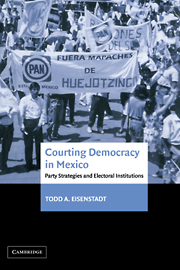Book contents
- Frontmatter
- Contents
- Figures and Tables
- Acknowledgments
- Courting Democracy in Mexico
- 1 Electoral Courts and Actor Compliance: Opposition-Authoritarian Relations and Protracted Transitions
- 2 Ties That Bind and Even Constrict: Why Authoritarians Tolerate Electoral Reforms
- 3 Mexico's National Electoral Justice Success: From Oxymoron to Legal Norm in Just over a Decade
- 4 Mexico's Local Electoral Justice Failures: Gubernatorial (S)Election Beyond the Shadows of the Law
- 5 The Gap Between Law and Practice: Institutional Failure and Opposition Success in Postelectoral Conflicts, 1989–2000
- 6 The National Action Party: Dilemmas of Rightist Oppositions Defined by Authoritarian Collusion
- 7 The Party of the Democratic Revolution: From Postelectoral Movements to Electoral Competitors
- 8 Dedazo from the Center to Finger Pointing from the Periphery: PRI Hard-Liners Challenge Mexico's Electoral Institutions
- 9 A Quarter Century of “Mexicanization”: Lessons from a Protracted Transition
- Appendix A Coding the Postelectoral Conflict Dependent Variable
- Appendix B Coding of Independent Variables
- Bibliography
- Index
9 - A Quarter Century of “Mexicanization”: Lessons from a Protracted Transition
Published online by Cambridge University Press: 22 September 2009
- Frontmatter
- Contents
- Figures and Tables
- Acknowledgments
- Courting Democracy in Mexico
- 1 Electoral Courts and Actor Compliance: Opposition-Authoritarian Relations and Protracted Transitions
- 2 Ties That Bind and Even Constrict: Why Authoritarians Tolerate Electoral Reforms
- 3 Mexico's National Electoral Justice Success: From Oxymoron to Legal Norm in Just over a Decade
- 4 Mexico's Local Electoral Justice Failures: Gubernatorial (S)Election Beyond the Shadows of the Law
- 5 The Gap Between Law and Practice: Institutional Failure and Opposition Success in Postelectoral Conflicts, 1989–2000
- 6 The National Action Party: Dilemmas of Rightist Oppositions Defined by Authoritarian Collusion
- 7 The Party of the Democratic Revolution: From Postelectoral Movements to Electoral Competitors
- 8 Dedazo from the Center to Finger Pointing from the Periphery: PRI Hard-Liners Challenge Mexico's Electoral Institutions
- 9 A Quarter Century of “Mexicanization”: Lessons from a Protracted Transition
- Appendix A Coding the Postelectoral Conflict Dependent Variable
- Appendix B Coding of Independent Variables
- Bibliography
- Index
Summary
The proper tactic should not be to boycott the election but to create an alternative program or alternative structure through the election.
Guideline on the [South Korean Assembly 1985] General ElectionWhile a few of the early electoral courts of Mexico's political opening packed courtrooms for public hearings, most were never heard from. A few featured a full slate of contentious cases and no-nonsense judges who overturned municipal elections with resounding gavels. Many were empty chambers except for the magistrates and the echoes of their rubber stamps of governors' commands. Institutional failure pervaded Mexico's first experiments with electoral justice, which was not surprising in one of the world's most fraudulent electoral systems. In fact, fewer than a third of the country's first institutional arbiters of electoral fraud successfully adjudicated postelectoral disputes by preventing disagreements from spilling out of the courtrooms and onto the streets.
Far from mere “second thought” reactions by losing parties, postelectoral conflicts were a bona fide informal institution and, arguably, were more important than the elections themselves during much of Mexico's protracted transition to democracy. This work has documented their existence in some 15 percent of Mexico's local elections between 1989 and 2000, but my numbers no doubt underrepresent their frequency. The pattern of extensive postelectoral conflicts during the first six years of the sample period and tapering off during the final six years is no doubt much more pronounced than my representation of them, due to improvements in news coverage during the final years of the study.
- Type
- Chapter
- Information
- Courting Democracy in MexicoParty Strategies and Electoral Institutions, pp. 270 - 292Publisher: Cambridge University PressPrint publication year: 2003



